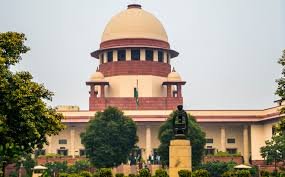Chief Minister N. Biren Singh’s belated apology for the ethnic violence in Manipur fails to heal deep-rooted divisions. Despite expressing regret and promising peace, his controversial handling of the crisis has led to a loss of trust among the state’s communities, especially the Kuki-Zo. As violence continues and protests mount, many question whether Singh’s leadership can restore stability to the troubled state.
BY Navin Upadhyay
Manipur’s Chief Minister, N. Biren Singh, has apologized to the people of the state and expressed regret for the ethnic violence that has plagued Manipur since May 2023. However, his belated apology may not suffice to heal the deep wounds caused by months of unrest and his alleged partisan handling of the crisis. The damage has been done, and the trust of a significant section of society has been lost. His gesture, coming too late, will likely not restore faith in his leadership.
#WATCH | Imphal: Manipur CM N Biren Singh says "This entire year has been very unfortunate. I feel regret and I want to say sorry to the people of the state for what is happening till today, since last May 3. Many people lost their loved ones. Many people left their homes. I… pic.twitter.com/tvAxInKPdg
— ANI (@ANI) December 31, 2024
In his apology, Singh expressed sorrow for the loss of life and displacement of people, acknowledging the devastating impact of the violence: “This entire year has been very unfortunate. I feel regret and I want to say sorry to the people of the state for what has been happening since May 3. Many people lost their loved ones, many people left their homes. I really feel regret. I would like to apologize,” he stated. However, this expression of regret seems insufficient in light of the violence and the government’s handling of the situation.
Singh went on to express hope for peace in the new year, saying, “Now, I hope that after seeing the last 3-4 months’ progress towards peace, with the New Year 2025, normalcy and peace will be restored in the state. I want to appeal to all the communities of the state that whatever happened has happened. We now have to forget past mistakes and start a new life. A peaceful Manipur, a prosperous Manipur—we should all live together.”
Despite Singh’s words, the reality on the ground paints a different picture. Security forces have been accused of committing atrocities against Kuki-Zo women in the state’s hill districts. Viral videos circulating on social media have sparked outrage, showing armed personnel allegedly harassing and assaulting women in Saibol, intensifying the public outcry. These videos have brought attention to the ethnic conflict, with widespread condemnation of the alleged abuses. One video shows women pleading for mercy while being confronted by armed security personnel, though the authenticity of the footage has yet to be confirmed.
~ You can't pray for 'both sides' while arming one!
Is there any state in India where there is a conflict of interest between the state and the central government while fighting an external aggression? The leaders in New Delhi failed to provide the central forces with clear-cut… pic.twitter.com/oMMxmV3aIH— suburban_hysteria (@LongjamVivek) December 30, 2024
COTU organised a Public Protest at Gamgiphai against unprovoked incessant attacks on Kuki areas such as Saibol, Mongneljang, Twichin and S Khonomphai by Meitei Militants since Christmas Eve.
An appeal was made so that the Valley Based Insurgency Groups (VBIGs) are withdrawn from… pic.twitter.com/5zQevwA8pk— Ravinder Kapur. (@RavinderKapur2) December 30, 2024
In response to the violence, Singh detailed the government’s efforts to address the situation, reporting that around 200 people have died, more than 12,000 FIRs have been registered, and over 600 people have been arrested. He also highlighted the recovery of arms, explosives, and ammunition, as well as efforts to aid displaced families, including the construction of new houses. But these statistics, while alarming, cannot erase the deep divisions and suffering that have resulted from the conflict.
The Kuki-Zo community remains deeply disillusioned with Singh’s leadership. The Chief Minister’s handling of the situation, especially the alleged targeting of women, has led to accusations of indifference to the suffering of the Kuki-Zo people. His failure to act decisively, and the ongoing violence, have caused widespread frustration. Calls for Singh’s resignation are growing louder, not only from the Kuki-Zo community but also from within his own party. The National People’s Party (NPP), a key coalition partner, withdrew its support from the government, citing Singh’s failure to restore peace and resolve the crisis.
Even within the BJP, dissent is growing. A group of 19 BJP MLAs recently demanded Singh’s removal, citing concerns over the economic and humanitarian toll of the ongoing violence. This internal discord highlights the eroding support for the Chief Minister and underscores the political instability in the state.
Singh’s political base is also under threat from regional parties. The Mizo National Front (MNF), an ally of the BJP in Mizoram, has called for Singh’s resignation, accusing him of exacerbating ethnic tensions. The MNF’s involvement underscores the broader regional implications of the crisis, as Mizoram shares cultural ties with the Kuki-Zo people.
On the ground, influential Meitei groups like the Co-ordination Committee on Manipur Unity (COCOMI) have intensified their protests. Despite Singh’s calls for reconciliation, these groups have carried out shutdowns and civil disobedience actions, reflecting the growing discontent with his leadership.
As Manipur remains on the brink of further unrest, the BJP faces a crucial decision. It must decide whether to continue backing Biren Singh or heed the growing calls for his removal. The party’s future in the state may depend on this decision, as the violence and instability continue to unfold.
For the people of Manipur, the stakes are incredibly high. Families displaced by the violence, from both the Kuki-Zo and Meitei communities, remain in limbo, waiting for a resolution that seems increasingly out of reach. The failure to restore peace has deepened mistrust, and the longer the conflict persists, the greater the risk of irreparable damage.
The Centre must act decisively to address the root causes of the crisis. A more comprehensive approach to justice, reconciliation, and dialogue is needed to prevent further bloodshed and begin the process of healing. Without such measures, the cycle of violence will continue to tear Manipur apart.
4o mini














